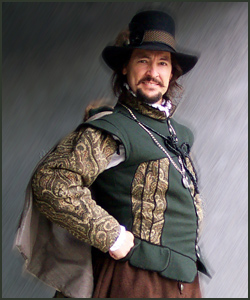| |
Captain John Davis
(1550 ~ 1605)
Portrayed by Lance Holt
Capt. John Davis - Master Navigator
~ by Lance Holt
John Davis, is considered to be one of the greatest Elizabethan mariners and explorers. He embarked on his first sea voyage while still a boy. Being from the west-country generally and Devon specifically (Sandridge, near Dartmouth), young Master Davis was on very friendly terms with the two great seafaring families of that county, the Gilberts and the Raleighs. Early on, he sailed with Adrian Gilbert and seems to have profited from this friendship. These two families both inspired and nourished Master Davis's enthusiasm for maritime exploration and adventure.
In 1583 he concluded that it was possible to navigate between Europe and the Far East around the north of America (the Northwest passage) and two years later, after consultation with Sir Francis Walsingham and the Queen's astrologer, John Dee, he was able to convince the English authorities to commission him with a crew under his command to explore the northern seas west of Greenland.
He attempted the discovery of the passage three times in all (1585, 1586, and 1587) and though he compassed as far north and west as what is now known as Hudson's Bay, he missed his mark, as Sir Martin Frobisher had before him, and failed to discover the Bay, though he apparently did sight Hudson's Strait. You will find many references to Captain John Davis in the maps and charts of the Arctic that commemorate and honor his enterprise and thirst for adventure.
In 1588, Captain Davis was back in England and was enlisted to command the Black Dog in the battle of the Spanish Armada, and in 1589 he was in the Earl of Cumberland's fleet operationg off the Açores.
John Davis was engaged to sail with Thomas Cavendish as his pilot and navigator for his second privateering expedition around the world in 1591. This proved to be quite the misadventure. Davis's alliance in this dubious undertaking may have been won by Cavendish's clever suggestion that a search might also be made for the Northwest passage from the western end rather than from the eastern. When Thomas Cavendish abandoned his fleet of privateers at the entry to the Strait of Magellan, Captain Davis continued on with his lone ship and crew to attempt the passage, only to eventually be driven back by tempest.
On his return home, he discovered the Falkland Islands. Captain Davis was more than a skilled navigator, he was also the author of two exceptional books on the navigator's art, "The Seaman's Secret" (1594), and "The World's Hydrographical Description" (1595). Of equal if not greater importance was his invention of the Back-Staff (Known as Davis's Quadrant or the Double Quadrant), which remained the principal instrument of navigation until Hadley introduced the reflecting Quadrant in 1731.
Captain Davis spent the rest of his life primarily seafaring, often in the Far East. He was commissioned as Master of Sir Walter Raleigh's flagship in the expedition to Cádiz and the Açores (1596-1597), and sailed as Pilot of a Dutch expedition to the East Indies from 1598 to 1600. During this expedition, he only narrowly escaped death by treachery in Sumatra. He was Pilot to Sir James Lancaster in 1601 to 1603 on his voyage to the east on behalf of the East India Company. In 1604 he sailed in the same capacity for Sir Edward Michelborne, but was killed the following year by Japanese pirates near the island of Sumatra.
Recently returned from expedition to Cádiz and the Açores, and after having successfully engaged the employ of the East India Company, Captain Davis is in the shire to augment his outstanding crew with a jack tar or barnacle bill.
Look lively and ye may yet see him with his Gentlemen Adventurer friends in one of the shire's many colorful taverns.
Careful not to engage him lest you have time to while away the daylight hours discussing celestial navigation or a supposed chart through the Northwest passage. Though single-minded in purpose, Captain Davis has been known to be pursuaded to share a tale or two over a proffered tankard of dark ale, but don't cross him lest ye have skill enough to defend yourself at swords point. The Captain has been to sea long enough to know how to back himself up with cold steel. Fluctuat nec mergitur!
Calendar | Links | News | Guestbook | Contact

